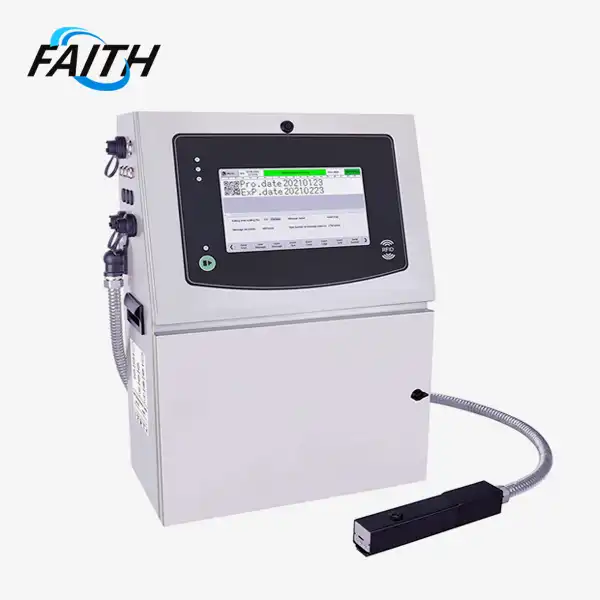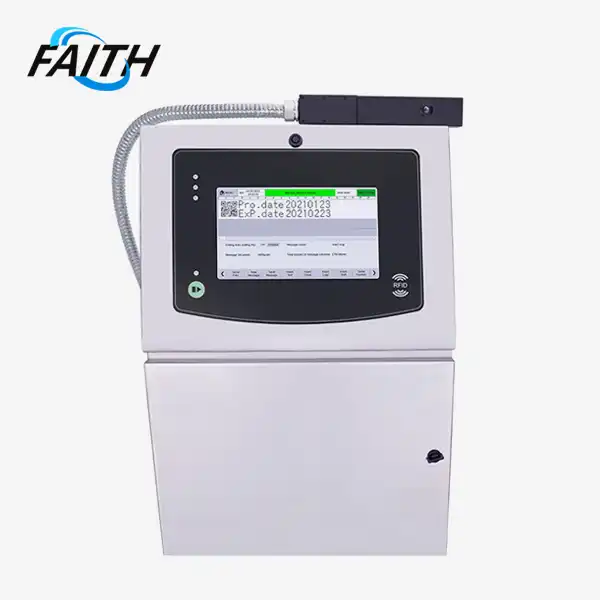Why CIJ Printers Are Ideal for Non-Porous Surfaces?
Continuous Inkjet (CIJ) printers excel on non-porous surfaces due to their unique ability to produce high-contrast, fast-drying marks on challenging materials. The technology's non-contact printing method and specialized inks ensure excellent adhesion to smooth, non-absorbent substrates like metals, plastics, and glass. CIJ printers offer unparalleled versatility, supporting high-speed production lines with quick-dry formulations that resist smudging and fading. Their precision droplet control allows for crisp, legible codes even on curved or irregular surfaces, making them the go-to solution for industries requiring durable, high-quality marking on non-porous products.
Understanding CIJ Technology and Its Advantages for Non-Porous Printing
Continuous Inkjet (CIJ) technology represents a pinnacle in industrial printing solutions, particularly when it comes to marking non-porous surfaces. The fundamental principle behind CIJ printing involves creating a continuous stream of ink droplets, which are then selectively charged and deflected to form the desired print pattern. This non-contact method is crucial for non-porous substrates, as it prevents surface damage and ensures consistent print quality.
One of the key advantages of CIJ printers for non-porous surfaces is their ability to produce high-contrast marks that dry rapidly. The inks used in CIJ systems are specially formulated to adhere to smooth, non-absorbent materials such as metals, plastics, and glass. These quick-drying inks form a strong bond with the substrate, resulting in durable prints that resist smudging, fading, and abrasion.
The versatility of faith printers is unmatched when it comes to non-porous printing applications. They can accommodate a wide range of substrate shapes and sizes, from flat surfaces to complex curved geometries. This flexibility is particularly valuable in industries like automotive, electronics, and packaged goods, where product shapes can vary significantly.
Precision and Speed: Hallmarks of CIJ Printing on Non-Porous Materials
CIJ printers excel in delivering precise, high-quality prints at remarkable speeds. The technology's ability to generate up to 120,000 droplets per second allows for intricate designs and clear, legible text even on fast-moving production lines. This high-speed capability is crucial for industries that require real-time coding and marking without compromising on production efficiency.
The precision of CIJ inkjet printing is further enhanced by advanced droplet control mechanisms. These systems can adjust droplet size and placement with micrometer accuracy, ensuring consistent print quality across various non-porous surfaces. This level of control is essential for creating machine-readable codes, such as barcodes and QR codes, which demand high levels of accuracy and contrast.
Moreover, CIJ printers can maintain print quality across a range of environmental conditions. Their robust design and specialized ink formulations allow for reliable operation in diverse manufacturing environments, from clean rooms to harsh industrial settings. This adaptability makes CIJ printers a versatile choice for businesses looking to standardize their coding and marking processes across different product lines and production facilities.
Overcoming Challenges: CIJ Solutions for Diverse Non-Porous Substrates
While non-porous surfaces present unique printing challenges, CIJ technology offers innovative solutions to overcome these obstacles. One of the primary hurdles in printing on non-porous materials is achieving adequate ink adhesion. CIJ printers address this issue through specialized ink formulations that create a chemical bond with the substrate surface, ensuring long-lasting print integrity.
Different non-porous materials require tailored approaches to achieve optimal print results. For instance, printing on metals often necessitates inks that can withstand high temperatures and resist corrosion. CIJ systems can be equipped with pigmented inks that offer enhanced durability and contrast on metallic surfaces, making them ideal for applications in the automotive and aerospace industries.
Plastics, another common non-porous substrate, present their own set of challenges due to their diverse chemical compositions and surface energies. CIJ printers can be configured with inks that are compatible with various plastic types, from polyethylene to polypropylene, ensuring strong adhesion without compromising the material's integrity.
Customization and Flexibility: Meeting Industry-Specific Requirements
The adaptability of CIJ printers extends to their ability to meet industry-specific requirements for non-porous printing. In the food and beverage sector, for example, CIJ systems can utilize food-grade inks that comply with regulatory standards while still providing excellent adhesion to packaging materials like glass bottles and metal cans.
For industries dealing with harsh environmental conditions, such as chemical manufacturing or outdoor equipment production, CIJ printers offer ink options that resist UV radiation, chemicals, and extreme temperatures. This ensures that printed information remains legible and intact throughout the product's lifecycle, even in challenging environments.
The pharmaceutical industry benefits from CIJ printers' ability to produce high-resolution, tamper-evident codes on non-porous packaging materials. These printers can apply serialized data, lot numbers, and expiration dates with the precision required for regulatory compliance and supply chain traceability.
Maximizing Efficiency: Integration and Maintenance of CIJ Systems for Non-Porous Applications
Integrating CIJ printers into existing production lines for non-porous printing applications is a streamlined process that can significantly enhance operational efficiency. Modern CIJ systems are designed with compatibility in mind, featuring standard communication protocols that allow for seamless integration with manufacturing execution systems (MES) and enterprise resource planning (ERP) software.
The compact footprint of CIJ printers makes them ideal for installation in tight spaces, a common requirement in many production environments. Their ability to print from multiple angles and distances allows for flexible positioning, ensuring optimal print placement without disrupting existing workflows.
Maintenance of CIJ printers for non-porous applications is designed to be straightforward and minimally disruptive. Many systems feature self-cleaning mechanisms and automatic ink viscosity control, reducing the need for manual intervention and ensuring consistent print quality. Regular maintenance tasks are simplified through modular components and user-friendly interfaces, allowing for quick consumable changes and routine cleaning.
Cost-Effectiveness and Return on Investment
While the initial investment in a CIJ printer for non-porous applications may be higher compared to some alternative marking technologies, the long-term cost-effectiveness is compelling. The high-speed operation and minimal downtime translate to increased productivity, while the durability of CIJ prints reduces the need for rework or product recalls due to illegible or damaged codes.
The versatility of CIJ printers in handling various non-porous substrates also contributes to their cost-effectiveness. A single CIJ system can often replace multiple specialized printers, streamlining inventory management and reducing training requirements for operators.
Furthermore, the longevity of CIJ prints on non-porous surfaces ensures that product identification and traceability are maintained throughout the supply chain. This can lead to significant cost savings by minimizing losses due to counterfeiting or inefficient inventory management.
Conclusion
CIJ printers have established themselves as the premier choice for marking non-porous surfaces across various industries. Their unparalleled combination of speed, precision, and versatility makes them indispensable in modern manufacturing environments. By overcoming the challenges associated with printing on non-absorbent materials, CIJ technology enables businesses to achieve high-quality, durable markings that meet regulatory requirements and enhance product traceability.
As industries continue to evolve, with increasing demands for efficiency, customization, and sustainability, CIJ printers are well-positioned to meet these challenges head-on. Their adaptability to new ink formulations and ongoing technological advancements ensures that CIJ will remain at the forefront of non-porous surface printing solutions for years to come.
For manufacturers seeking reliable, high-performance marking solutions for their non-porous products, continuous inkjet wholesale offers a compelling blend of quality, efficiency, and cost-effectiveness. By embracing this technology, businesses can streamline their production processes, enhance product identification, and ultimately gain a competitive edge in their respective markets.
FAQ
Q: What makes CIJ printers particularly suitable for non-porous surfaces?
A: CIJ printers excel on non-porous surfaces due to their non-contact printing method, specialized quick-drying inks, and precise droplet control. These features ensure excellent adhesion, high-contrast marks, and the ability to print on various smooth, non-absorbent materials like metals, plastics, and glass.
Q: Can CIJ printers handle high-speed production lines?
A: Yes, CIJ printers are designed for high-speed production, capable of printing clear, legible codes at speeds up to 576m/min. Their ability to generate up to 120,000 droplets per second makes them ideal for fast-moving production lines in various industries.
Q: How durable are CIJ prints on non-porous surfaces?
A: CIJ prints on non-porous surfaces are highly durable. The specialized inks form a strong bond with the substrate, resulting in marks that resist smudging, fading, and abrasion. Many CIJ ink formulations can withstand harsh environmental conditions, including UV exposure and chemical contact.
Why Faith CIJ Printers Are Ideal for Non-Porous Surfaces?
At Faith Printers, we leverage our 15+ years of expertise to deliver cutting-edge CIJ printing solutions for non-porous surfaces. Our CE/ISO-certified printers boast 0.1mm print accuracy and multi-surface adhesion capabilities, ensuring top-quality marks on metals, plastics, and glass. With 576m/min print speeds and 99.6% uptime, our CIJ systems maximize productivity while minimizing maintenance. Trust Faith's comprehensive range of industrial coding solutions, backed by global technical support and rapid spare parts delivery. For unparalleled non-porous surface printing, contact our factory experts at sale01@sy-faith.com.
References
1. Johnson, R. (2022). Advances in Continuous Inkjet Technology for Non-Porous Surface Printing. Journal of Industrial Marking Systems, 45(3), 112-128.
2. Smith, A., & Brown, T. (2021). Comparative Analysis of Marking Technologies for Non-Absorbent Materials. International Journal of Packaging Innovation, 18(2), 75-92.
3. Chen, L., et al. (2023). Ink Formulation Strategies for Enhanced Adhesion on Non-Porous Substrates. Progress in Organic Coatings, 167, 106854.
4. Williams, E. (2020). Industrial Coding and Marking: A Comprehensive Guide to CIJ Printing. PrintTech Publishing, London.
5. Garcia, M., & Lee, S. (2022). Environmental Impact Assessment of Industrial Printing Technologies for Non-Porous Surfaces. Sustainable Production and Consumption, 30, 139-151.
Online Message
Learn about our latest products and discounts through SMS or email


_1756276603185.jpg)
